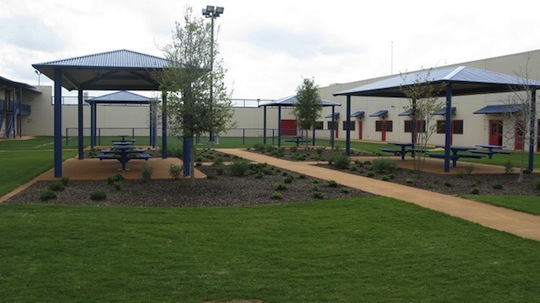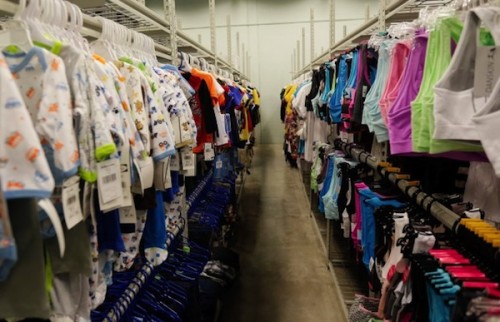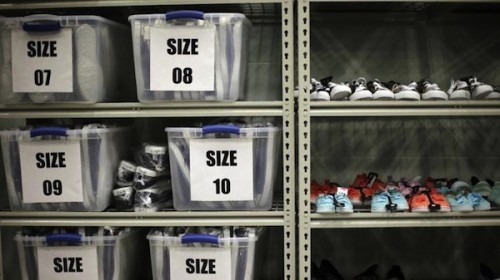Texas: Deluxe Detention Center for Illegal Aliens Gets an Upgrade
08/02/2014
Ive reported earlier about the fancy lodging for alien invaders in Karnes County Texas that cost $30 million to build and included cable TV, basketball courts, a library and Internet access. 
The facility was so over the top that Congress investigated it in 2012: Holidays on ICE: Committee Examines Deluxe Detention for Deportables.
Judiciary Chair Lamar Smith (R-TX) noted in his statement to the Committee regarding the investigation that “Under this administration, detention looks more like recess. While funds for American students’ physical education classes are being cut, the new detention standards expand recreation for illegal immigrants.”
But this administration has upgraded the alien facility still further to include medical exams for children within 24 hours of arrival and women within a week. By comparison, our veterans have been made to wait for months to get urgent healthcare, sometimes not surviving the delay.
The administration is proud of itself for providing flat-screen TVs in kid-friendly individual rooms and free stuff galore for the aliens, and recently invited the media for a tour. Greta van Susteren was outraged at the luxury and cost:
Below, the array of free stuff for aliens is stunning, from racks of new clothes to shoes sorted by size.
This message of American jails as nice as hotels will certainly be playing widely in Central America and beyond, enticing even more future Democrats to come.
Immigrant Detention Center Has Hair Salon For Women, Associated Press, August 1, 2014
KARNES CITY, Texas (AP) — Federal immigration officials on Thursday sought to show the softer side of immigrant detention, complete with cartoon wall murals, stuffed animals, playgrounds, snacks and a hair salon at a South Texas facility that will house women and their children who crossed the border illegally.
With a surge in illegal immigration in recent months, especially children traveling alone and parents bringing in children from Central America, authorities moved to convert an all-male detention facility about 50 miles Southeast of San Antonio into one that could temporarily house families.
The Karnes County Residential Center is the third such family center in the nation, with the others in the New Mexico and Pennsylvania, and more could be on the way.
The facility will start receiving immigrants on Friday and can house up to 532 people at a cost of about $140 a day per person.
The Karnes County local government contracts the day-to-day operation with the private prison company The GEO Group.
Border Patrol agents have detained more than 57,000 immigrant children crossing the border alone since October.
President Barack Obama has called it a humanitarian crisis, warning parents of the dangers of sending children with smugglers.
No adult males will be housed at the Karnes County facility and the families placed there will be from those picked up in Texas along the Rio Grande Valley. Officials said they didn’t know how many it will get the first day or how long it will take to fill up.
Enrique Lucero, field office director for U.S. Immigration and Customs Enforcement said while each case will vary, officials are planning an average stay of 23 days per family.
Federal immigration officials gave separate tours for media, local governments, consular officials andimmigrant advocates on Thursday to show what residents will be afforded once they pass through the 15-foot gate to temporarily live behind high concrete walls.
The only person allowed to be quoted during the media tour was Lucero.
Once they enter under the welcome sign — in English and Spanish — immigrants will be processed through showers and health screenings and allowed to select clothes for themselves and their children. Mothers also can request diapers, baby bottles, pacifiers and blankets.
Further inside they will have access to a dental care, a bilingual library, playrooms, child care, pay phones, flat-screen TVs, free Internet access, indoor and outdoor basketball courts, weightlifting equipment, a small soccer field and a soon-to-be installed playground play scape.
Many of those amenities were already in place. The center opened in 2012 and was built to meet standards set after immigrant advocate groups complained the government previously held children behind razor barbed wire in facilities with strict rules and run by staff trained to deal with hardened criminals.
Officials still moved to further soften the edges of the Karnes County facility, with touches like the painted cartoon murals with rockets ships, colorful fish and zoo animals, “to make it more family friendly,” Lucero said.
For example, a look inside a family sleeping room revealed a stuffed animal and a copy of “Green Eggs and Ham” laid near the pillow of child’s bunk.
Staff that previously worked with adult males also had to be trained to oversee children, including lessons in pediatric CPR. The facility also contracted with a local school to bring bilingual elementary, middle school and high school teachers to the on-site classrooms. School-age children will be required to attend classes while they live there, Lucero said.
Even the building name was changed to make it sound less severe, from the Karnes County Civil Detention Center to the Karnes County Residential Facility.
Despite the amenities, authorities insist that immigrant families should not consider it a desirable destination. It is a detention facility and residents cannot leave until they have been legally processed for asylum or deportation, Lucero said.
“Our borders are not open to illegal immigration; if you come here illegally and don’t have a legal basis to stay under our laws, we will send you back,” Secretary of Homeland Security Jeh Johnson said in a statement. “The opening of this additional facility represents our continued commitment to provide temporary facilities for adults with children while they undergo removal proceedings.”
Because officials had run out of room at holding facilities, they began releasing immigrant families and requiring them to report back within 15 days.



